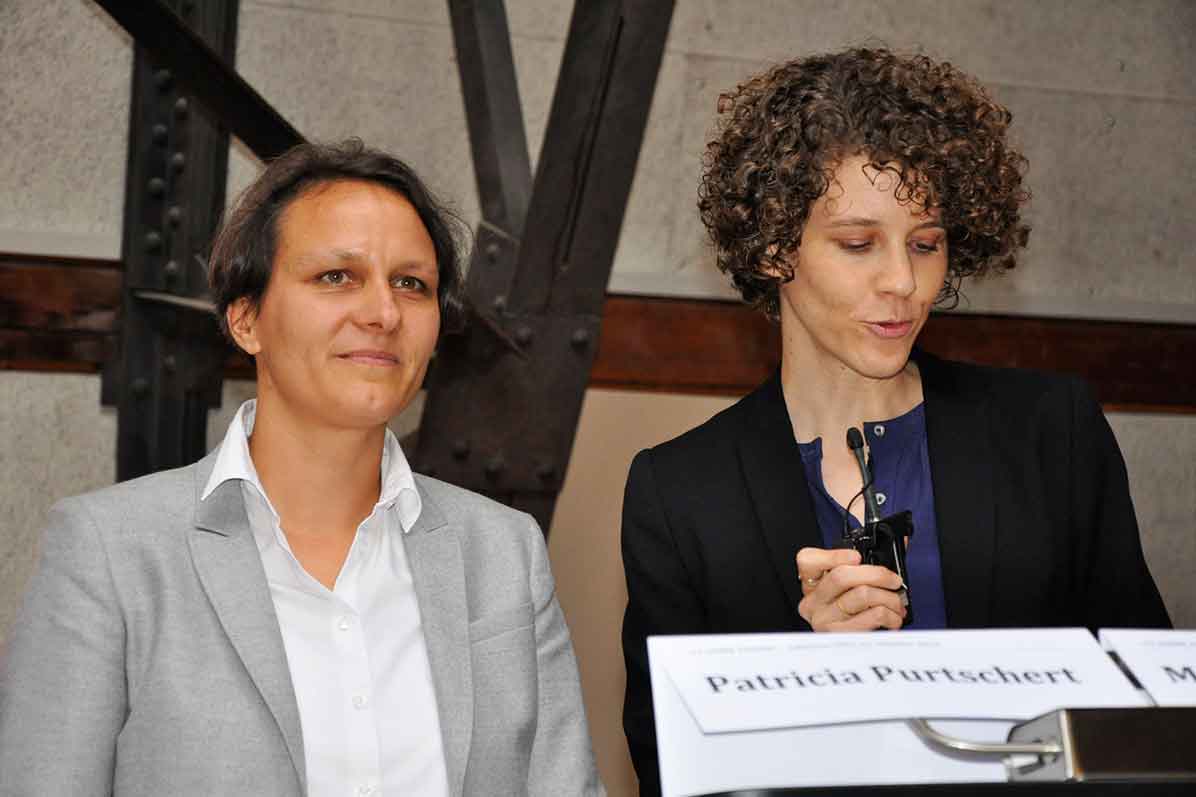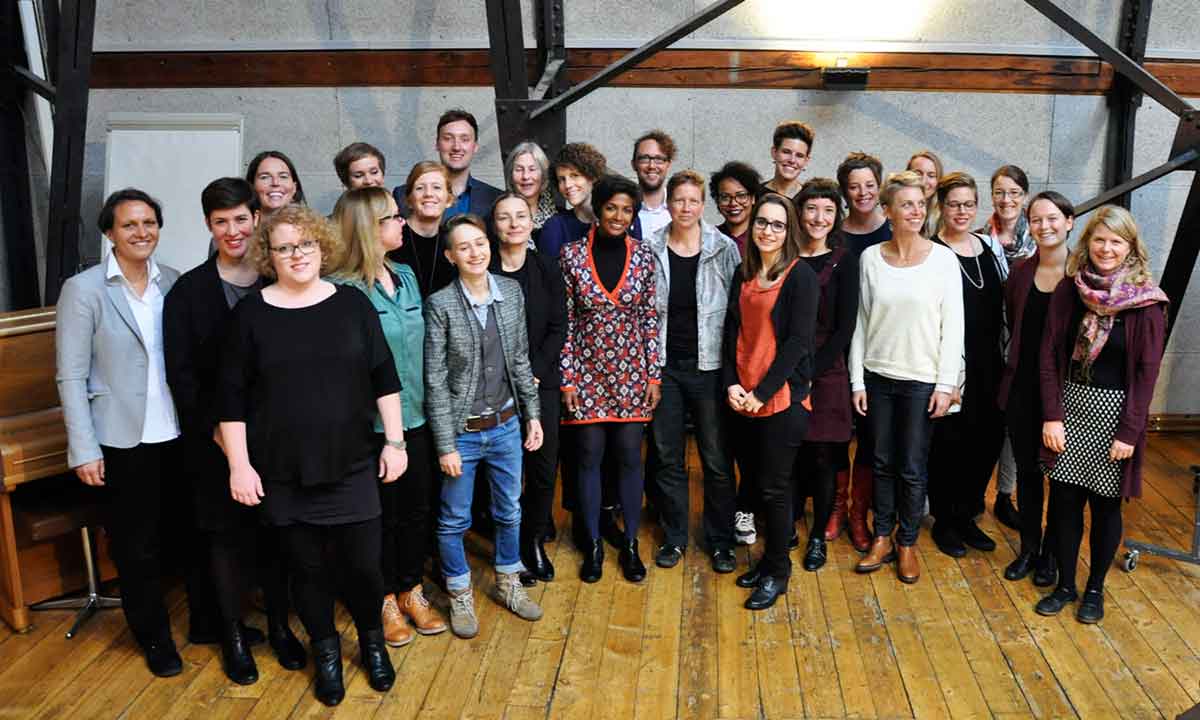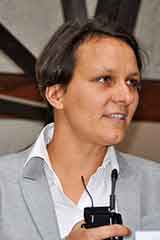"Our research is relevant for society"
The Interdisciplinary Centre for Gender Research (IZFG) is celebrating its anniversary: For the last 15 years, gender research has been carried out across different faculties at the University of Bern, incorporating issues such as human rights, care, social precarity and postcolonialism. With this, the co-leaders Patricia Purtschert and Michèle Amacker are aiming to attract political attention.
Michèle Amacker and Patricia Purtschert took on the role of co-leaders of the IZFG one year ago following the death of Brigitte Schnegg, who suffered an unexpected heart failure at the age of 60 in 2014. Schnegg had led the centre since it was founded in 2001. Amacker tells us of the difficult time that followed Schnegg’s death: "It was an emotional shock and hard to believe that Brigitte, who was so full of life, would no longer be there." Her enormous commitment, her sharp mind and her enthusiasm were what characterised her. The memorial wall in the entrance hall of the IZFG is a testament to how much Schnegg’s work shaped the centre and how much her presence is still felt today. After Schnegg’s death, Amacker, together with Tanja Rietmann, took on the interim leadership of the IZFG. With a sense of self-responsibility and empowerment – the team had to bring in money for research projects themselves overnight, lead negotiations, all the things that Schnegg had done before – they managed to achieve independence. A process from which people are still benefitting today.


The sociologist and philosopher complement each other well
Both Amacker and Purtschert find that co-leadership makes sense, and it is innovative and challenging. It is rewarding to have somebody on the same level as you with whom you can discuss things and make decisions together. Purtschert says: "The model is definitely related to Gender Studies in that it investigates how hierarchies can be organised in a different way. The co-leadership model has lots of advantages for the workplace and for employees, but it is still not used widely enough in universities." Purtschert adds: "I have benefited a lot from Michèle’s extensive knowledge. And conversely, you ask different questions when you come from the outside, and that can be very enriching." As a cultural scholar and philosopher, Purtschert also introduced new topics and methods. Bringing these together with the previous approaches at the IZFG – for example historical, legal or sociological subjects – is exciting and lucrative. In any case, an interdisciplinary approach to subjects such as wage inequality, sexism, poverty or discrimination is important in order to understand them to their full extent. Purtschert says: "Key issues include how societies are structured by inequality and to what extent power is linked to gender and other relevant differences. The images that people have of themselves and of others in their heads have an impact on who is seen as suitable for a political office – for example the US presidency – or who is more controlled by police, as shown in the current debate on 'racial profiling' in Switzerland. It is important not to consider things in isolation, but rather to deal with the connections with issues such as poverty, inequality, homophobia or racism. That is why multidimensional approaches to gender are essential for us." Amacker incorporates another aspect: "For us, it is not just important to generate knowledge of the highest quality; we also want to enter into dialogue with the public. With this in mind, we aim to question changes in society critically and also initiate them – and therefore ensure we are relevant to society." Amacker tells us of a current transdisciplinary research project which is looking at social services in the agricultural sector, for example the so-called "Time-Out" places for young people. “In this project, farmers, authorities and family placement organisations all formed part of our research team. Not only were the questions raised together, but the knowledge was also jointly generated." The philosopher and the sociologist appear to complement each other well.

Gender Research as a subject for several disciplines
From the very beginning, the centre – which, contrary to at other universities, is located outside of the faculties and is therefore less tied to a specific discipline – set itself the task of incorporating gender research into various disciplines. Brigitte Schnegg was initially appointed as the director and was only named an honorary professor at a later stage due to her services. In contrast to this, Amacker and Purtschert have internal professorships and are therefore anchored within a faculty. However, the IZFG continues to be an interfaculty centre with a network set-up, and Gender Studies remains a transverse subject at the University of Bern. This means that there is no Bachelor’s degree for Gender Research at Bern, but there is a Minor Masters course in it, as well as an interdisciplinary PhD programme. Gender Studies can also be studied at a Masters level as an addition to a main subject. PhD students from all disciplines with a focus on Gender Research can apply for the doctorate programme, and it is now also possible to do a doctoral thesis on the subject of Gender Research.
"We do aspire to support socio-political processes"
When asked whether their work has an influence on politics, Amacker says: “We do aspire to support socio-political processes with our research by providing analysis that can form the basis for decision-making.” This is how the IZFG works on research assignments set by the government, for example as part of the Swiss Competence Centre for Human Rights (SKMR. For example, on behalf of the EDA / Equal Opportunities Department, the IZFG designed a web application for so-called “agreed language” with key words and legal documents for women’s and human rights. In this context, the IZFG, as an academic body, was a member of the Swiss delegation at the UN’s Commission on the Status of Women. And regarding domestic politics? The IZFG receives mandates not only from the government, but also from non-governmental organisations or foundations. For example, on behalf of Caritas Switzerland, the IZFG investigated the situation of one-parent households affected by poverty in connection with the new custody regulations. The results were ultimately included in a position paper which Caritas wrote for the attention of Parliament. Purtschert adds: “In the cultural sciences, work is carried out based on a different concept of politics, which goes beyond institutionalised processes. They are also interested, for example, in how people develop forms of resistance against prevailing conditions. The research into such phenomena means that not only do we generate knowledge, but we also absorb knowledge that is generated in society, such as in the ‘Aufschrei’ (“Outcry”) campaign happening right now, which stands against all forms of sexism.”
The issue of the many third-party donors

With 15 full time roles occupied by 25 people, this is a large Gender Studies institute in Bern. The IZFG has a large proportion of external third-party donors. This means that the majority of employees are temporarily employed in research projects which are financed by external funds. Acquiring new research projects and mandates is therefore a very important part of the centre and requires a lot of work. "At the same time, it is also very inspiring to work on current issues that are highly relevant to society," says Amacker. Purtschert adds: "We combine academic work with the question of how to create a fairer world. That is the ideological horizon which links our work across all its different focuses."
About Michèle Amacker

Michèle Amacker has been an assistant professor for interdisciplinary gender research since February 2016 and is co-leader of the IZFG. She studied and completed a PhD in Sociology at the University of Fribourg and was a member of the interdisciplinary Gender Studies doctorate programme at the University of Bern. She then worked as a research associate and lecturer for empirical social research methods at the IZFG. In 2014, she became co-leader of the centre along with Tanja Rietmann. Her research focuses on social precarity, poverty, social inequality, occupational sociology, discrimination and transdisciplinary research methods.
Contact:
Prof. Dr. Michèle Amacker
Universität Bern
IZFG
Vereinsweg 23
3012 Bern
T +41 31 631 52 28
E-Mail michele.amacker@izfg.unibe.ch
About Patrica Purtschert

Patricia Purtschert has been an associate professor for interdisciplinary Gender Research at the University of Bern since February 2016 and is co-leader of the IZFG. After completing a degree in Philosophy in Basel and Accra, she worked as an assistant at the Gender Studies Centre in Basel and completed a PhD in Philosophy at the University of Basel after a two-year residency at the University of California Berkeley. After post-doc residencies at the University of Paris X and the Humboldt University in Berlin, she carried out an Ambizione project at the ETH University. Her research focuses on feminist theory, intersectionality and postcolonialism.
Contact:
Prof. Dr. Patricia Purtschert
Universität Bern
IZFG
Vereinsweg 23
3012 Bern
T +41 31 631 37 46
E-Mail patricia.purtschert@izfg.unibe.ch
Interdisciplinary Centre for Gender Research IZFG
The IZFG, as a cross-disciplinary network, pools gender competencies at the University of Bern and acts as a competence centre for interdisciplinary and transdisciplinary gender research at the crossover between academia and practice. Professors from different subjects and faculties are involved in the centre and students with backgrounds in various disciplines complete their degrees in gender research here. The IZFG discusses socio-political issues from a gender perspective, focusing on the areas of "Gender & Development", "Human Rights & Discrimination", "Equality Policy & Gender Mainstreaming", "Poverty & Social Precarity", "Care" and "Postcolonialism". Over the past few years, the IZFG has taken on several mandates and consultations in these subject areas and has made a name for itself internationally with innovative products.
About the author
Brigit Bucher works as the Deputy Head of Corporate Communication at the University of Bern and is the Editor of "uniaktuell".